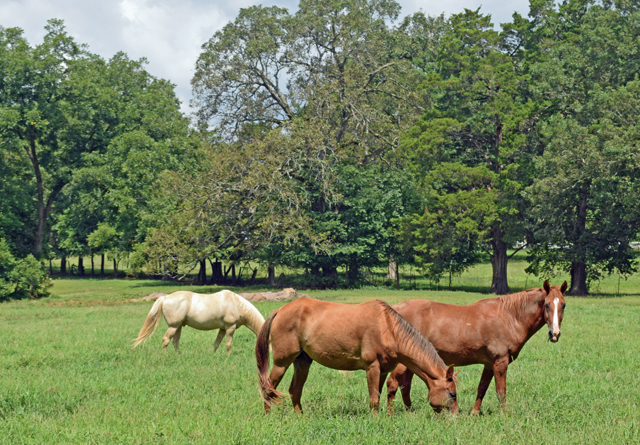
Starting in July, horses will be required to have electronic equine CVIs to track each interstate movement. Photo credit: Doug Mayo, UF/IFAS
Saundra TenBroeck, UF/IFAS Extension Horse Specialist
—
Current Horse Transportation Requirements
The Florida Department of Agriculture and Consumer Services (FDACS) regulates entry of horses into Florida and at equestrian gatherings. Rules may vary from state to state, so you should check what documents are necessary when hauling out of state (Interstate Animal Movement Requirements). Traveling with your horse within and outside the state of Florida will require proof of negative Coggins (EIA) test within 12 months. Your veterinarian may use paper forms where identifying marks are drawn and described or they may subscribe to Global Vet Link and submit paperwork electronically with digital photographs. For a more convenient form of verification, you can purchase a laminated Negative EIA Verification Card from FDACS. It is important to note that the EIA verification card is only valid within the state of Florida.
For interstate travel, you also need an Official Certificate of Veterinary Inspection (CVI), more commonly referred to as a “health certificate”. The CVI expires 30 days after the date the horse is inspected. Currently, horse owners can pursue one of two options that will extend the expiration of the CVI to 6 months. One option, the Equine Event Extension is a paper document honored in AL, AR, GA, LA, SC, VA, and WV when accompanied by the CVI and proof of negative EIA test. A second option is called the Equine Interstate Passport Card. It is currently accepted in AL, AR, GA, KY, LA, MS, NY, NC, OK, SC, TN, TX, VA and WV as proof of CVI and negative EIA test.
Changes are coming!
After June 30, 2019, Equine Event Extensions and Passports will no longer be issued. Why? State Animal Health Officials are expected to trace movements of animals so that intervention can be swift if there is a disease outbreak. With passport cards, movements are not readily traceable. Beginning January 1 of 2020, most states will not accept passport cards. The new Electronic Equine CVI, or EECVI, will require the vet to do the initial exam and then the owner must go online and request a permit for each movement or event. The change is being made to provide better documentation of movement of horses, so appropriate measures can be taken if there is a disease outbreak. At the present time Global Vet Link is the only provider of the electronic equine CVI, but a second provider may come on line before the deadline of January 2020. A likely candidate is Ag View, a health monitoring company with services across the livestock industry.
Another important piece of the biosecurity/traceability puzzle is Premise Registration. Though not mandatory in Florida (unless getting a passport or 840 microchip), premise identification is a program established to plan for, control, and prevent the spread of agricultural diseases. It is also used as an early warning system to notify animal owners of a natural disaster such as a flood or fire that could affect their animals or operations. By completing an application for premise registration, and keeping your information up-to-date, you will take an important step in protecting your animals and those of other Floridians. After hurricane Catrina the Louisiana horse industry supported legislation mandating Premise Identification. The Premise number is an alpha numeric representation of a physical location. If you sell your property, FDACS should be contacted and the premise registration information updated.
Horse Identification
Finally, traceability is not possible without proper animal identification. Though recording gender, color, and markings is standard, digital photographs will be required for electronic CVI. Microchips are becoming more widely accepted in the horse industry. USDA 840-ID chips are considered universal by USDA. Several show horse associations are requiring microchips. Other indications for microchip use are sale, ownership, theft prevention, rescue, disaster preparedness, health certificate ID, and Coggins official ID and registry.
- Dr. Saundra TenBroeck is Looking Forward to Looking Back after 40 Years of Service - October 10, 2025
- End of Life Issues – Euthanasia:A Horse Owner’s Final Act of Care - October 4, 2024
- Economic Impact Study Indicates the Florida Equine Industry Remains Strong - April 12, 2024
